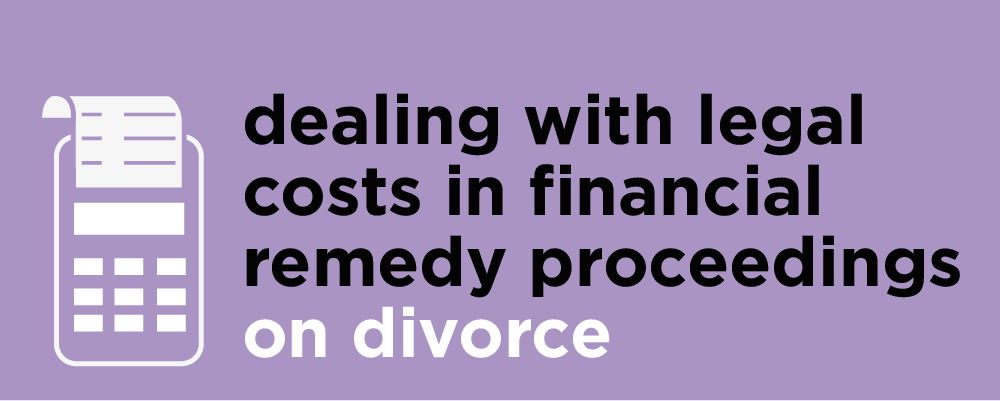- Basildon 01268244144
- Chelmsford 01245453800
- Colchester 01206217300
- London 020 4586 1280

Since 2006, it has been the general rule that in financial remedy proceedings, the court will make no order as to costs. This means that generally speaking, each party will have to bear their own legal fees.
Prior to 2006, the court could and did routinely make cost orders in family cases. Calderbank offers were admissible to the Court, which enabled parties to make offers of settlement at any time before a trial, which would not be seen by the trial judge. These offers were often called “Without prejudice save as to costs.”
If the party that made a Calderbank offer bettered that offer at trial, they could then invite the Court to make a cost order against the party who rejected the offer. At the same time, they had the benefit of knowing the trial judge would not know of or take into account such an offer as their bottom line (or worst case scenario) before determining the case.
This old cost regime very much focussed the minds of the parties and their advisors on making sensible offers, for fear of being saddled with a cost order if they did not.
Calderbank offers faced a lot of criticism, hence their removal from the family justice system in 2006. Their departure has however resulted in a situation where parties in family proceedings often feel they can be as unreasonable as they like, without any risk of costs being ordered against them. The unreasonable litigant should be forewarned however, that whilst the general rule may be “No Order as to Costs,” the court does retain power to order costs where there has been litigation misconduct.
Rule 28.3 of the FPR states:-
“6) The court may make an order requiring one party to pay the costs of another party at any stage of the proceedings where it considers it appropriate to do so because of the conduct of a party in relation to the proceedings (whether before or during them).
(7) In deciding what order (if any) to make under paragraph (6), the court must have regard to –
(a) any failure by a party to comply with these rules, any order of the court or any practice direction which the court considers relevant;
(b) any open offer to settle made by a party;
(c) whether it was reasonable for a party to raise, pursue or contest a particular allegation or issue;
(d) the manner in which a party has pursued or responded to the application or a particular allegation or issue;
(e) any other aspect of a party's conduct in relation to proceedings which the court considers relevant; and
(f) the financial effect on the parties of any costs order.”
Rule 4.4 of Practice Direction 28A of the FPR further details that in considering conduct:
“… the court will have regard to the obligation of the parties to help the court to further the overriding objective … and will take into account the nature, importance and complexity of the issues in the case. … The court will take a broad view of conduct for the purposes of this rule and will generally conclude that to refuse openly to negotiate reasonably and responsibly will amount to conduct in respect of which the court will consider making an order for costs. This includes in a ‘needs’ case where the applicant litigates unreasonably resulting in the costs incurred by each party becoming disproportionate to the award made by the court….”
It therefore follows that parties do still need to be careful to make sure that they make sensible offers early on and deal with a case proportionately to the issues and assets involved.
The difference between the two cost regimes remains however, that whereas before 2006 a party could make an offer “without prejudice save as to costs,” such offers are no longer admissible in the family Court. This means that even the most sensible and well pitched without prejudice offer early on, would be ignored at the point of trial on the question of costs. This means that parties have to be open in their offers if they want to be able to rely on them at trial on the issue of costs.
The other drawback which remains in the new cost regime, is that except in specific stand alone applications, costs orders will only be made in the substantive financial remedy proceedings at the point of trial. If the general rule is still “No Order as to Costs,” who would really want to pursue a matter to trial in the hope the trial judge will agree that theirs is a case where that general rule should be disapplied?
Thankfully, very few financial remedy cases reach trial, but clearly those proceedings, where necessary, must be dealt with carefully throughout in case they do reach that stage.
At Birkett Long we have a large team of specialist divorce lawyers with many years of experience in conducting and settling financial remedy cases. We offer a free, no obligation 15 minute chat to see how we can help you, so please get in touch. I can be contacted on 01206 217384 or mel.loxley@birkettlong.co.uk.



Comments